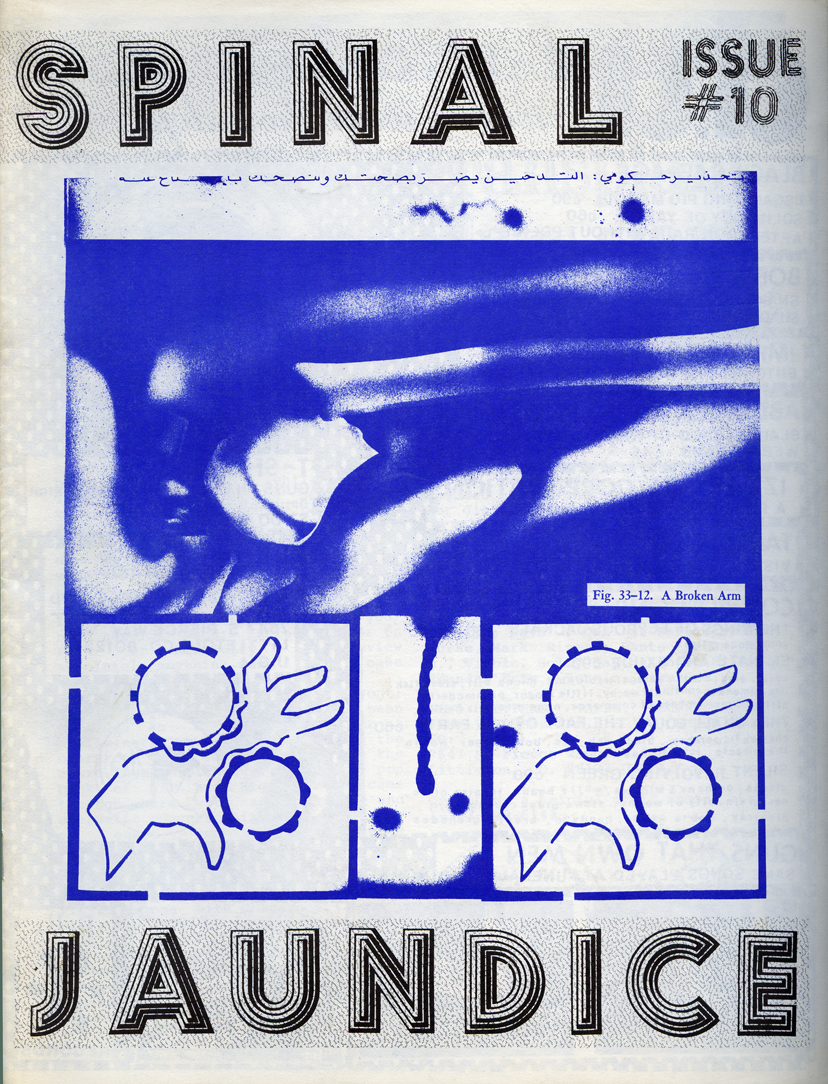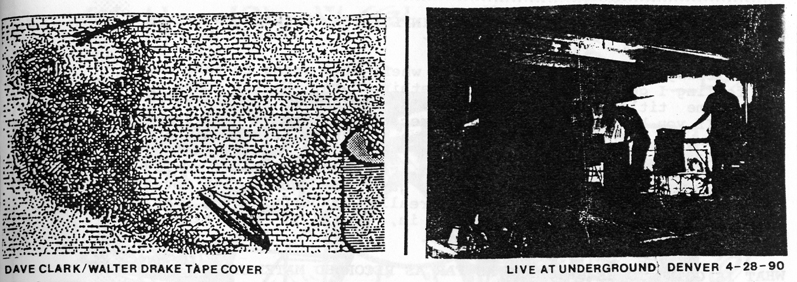
Colorful, image-laden, easily immersable, experimental. Dave Clark’s lengthy tape repertoire, made with guitar agent Walter Drake, exists as a bank of inventive sound sources produced from the inner Denver area of the state in which these guys reside. Sans vocals, non-studio produced, and with a ‘band’ name no more than their own names, their unreal sounds really have this ‘warm’ sort of approach. Hey, a handful of their work can be had from New York’s Sound Of Pig Music and the rest from Dave directly. So score one and feel like a neighbor. Interview with Dave Clark.
MJ: How would you categorize the music you and Walter release?
DC: Reviewers have been categorizing it as somehow inbetween industrial and new age. And electronic. And I guess I never thought about categorizing it that much until they did. And their reviews got so visually oriented that I decided that was something that I liked. Which is really where I came from is a visual background. That’s what we’re after, the visualization, that altering of consciousness whether it goes visual or not. I think that some people just like to kind of zone out and go wherever they go, whether it’s a visual place or they just feel different.
MJ: One thing I’ve noticed exclusively about new age stuff is the general formlessness. But yours has a lot more texture, a lot more happening.
DC: Yeah…When I was a DJ in like 1983 and 1984 I thought new age was a great idea. And actually the stuff that came out fairly early on wasn’t quite so boring as what’s come on now. People that adhere a form and then take it to its boring extreme and that goes for just about any genre you can think of. But texture…that’s one of the most important things about music as far as I’m concerned. Really, I’m not that great at playing it but I like to listen to music that has depth, and is hot in that way. And learning it comes along sooner or later. I’ve opted to do what I can with texture and that requires different instruments.
MJ: On all of your cassettes, there’s an imprint saying “The Theta brainwave has been associated with drowsiness and hypnogogic visions.” Does your music or the listener reflect this?
DC: Actually that came from a study I did…I took a videotape that I was working on and was hooking 10 people up to it, and it was pretty abstract stuff. Then I hooked them up to the news. And what I learned during that was while you’re watching the video it doesn’t make much difference. But there’s a period afterwards where some people were kind of going, “Ahhh…” and that was where the Theta got pretty high. About 8 out of 10 with the abstract video art. Whereas only 3 out of 10 did it with the news. So it’s sort of a thing that I got on to. It carried over into music later on because I thought, “That must be the area” from what I read about Theta, Beta and Alpha. I decided that’s where I wanted to go and to create visions.
MJ: Can drowsiness be a creative technique?
DC: The surrealists did a lot of playing with that. Trying to get to breaking down conscious thought, they would play games and try to stay awake as long as they could so they would be drowsy, and that kind of stuff really fascinates me…Because I’ve had full-fledged ideas when I’ve woke up in the morning because I couldn’t get to sleep because this idea kept pounding away. It’s not as common but it has happened.
MJ: What kind of equipment do you use?
DC: Mainly Walter plays 12-string guitar, which he’s really well developed on. That’s his primary instrument, although he just got that when I met him, so he was a 6-string classical guitarist. He’s just naturally bent in that direction. Creating these little quirky arrangements that I think makes it pretty cool. Later on, he bought a bunch of things like samplers, at first it was just Casios that we both had. Then later I got into the DX sampler, Roland synthesizers, and another sampler that Roland made that was a rack mount. Plus the extended Digitech echo models. So we have a lot of things that we can pull in and pull out at any time with a 4-channel mixer. But our main thing that we did first was sampling. Walter’s pretty good at finding bizarre sounds.
MJ: What kinds of activities would be suitable while listening to your music?
DC: I guess a lot of people consider it non-music. They put it on because they don’t have to listen to it like that. I like to think it has enough bents in there to make it interesting. You know, we’ve got a lot of drones, but it’s putting in those quirky little noises and sounds that make it more interesting. I’d like to view it as someone just sitting around drinking coffee. Sitting there thinking about a problem…kind of like how dreams will work with your reality, and maybe they almost have a conscious dream. I think that’s what the ideal state is. I don’t think a lot of people do that, I don’t even get to that spot all that much. While Walter and I are playing it back, we just get really high, just an incredible feeling that we get. A lot of times when we’re playing we don’t really like it. And then when we hear it back we’re just like, “God…is that us?”
MJ: Do you have some kind of surrealist influence? Perhaps in titles of pieces?
DC: With titling I just let it take me where it’s going to take me, the feeling I get after putting something down. Walter comes up with some titles but mostly that’s my job. It’s just fun to title. If you kind of get into that receptive state it will take you somewhere. Surrealist works had a definite effect on that. Particularly Paul Eluard. He said he wasn’t music-conscious though, but his work was so romantic, really beautiful. I really couldn’t put it any other way. This guy loved women, he loved things of beauty. It was just really wonderful to do that, especially in the environment I was in, where it was kind of filled with a lot of negative things.
MJ: What is going to be upcoming as far as recorded materials?
DC: The latest tape we have is very much less melodic and goes more for the hypnotic area. Lots of repetition, lots of textural washes that fade in and out. I think it’s the most powerful thing we’ve done so far. Although we may get more melodic. I think it’s just what our moods do. We’ve always tried to outdo what we’ve done before and it also gets intimidating when you start to like your stuff a lot. I just want to keep it hypnotic but I also want more variety in it. I think Walter feels the same way. The new tape is called “The Mesmerization Of Water/Several Events Related To Wind” and it’s 60 minutes…I’ve found this length to be most suitable.
MJ: Do you personally see compact discs as the way to go?
DC: Yeah. Even though a lot of people don’t like them or don’t like the fact that they’re being forced down their throats…But reality is reality. I don’t have a CD player myself, but…It’s like people who stuck with the 8-track cartridge format when cassettes came out. I think LPs will be fine for a few years but it will be harder and harder to find people to make them and it will be harder and harder to find people to buy them. It’s already kind of like that. Most people going to a record store today don’t really buy cassettes unless it’s somebody that they really know. Our CD will be a re-release of the “Thought Climatology” cassette.
MJ: Who are some others that you think are doing interesting things currently?
DC: 23 Skidoo. I’ve really liked everything they’ve done, particularly in the percussive area. African Head Charge is one. A lot of this stuff has nothing to do with Walter and I. Walter too, his influences are Ravi Shankar, Sharma, The Beatles, Dylan, Zappa, Hendrix, Prince and Phillip Glass. And I come from more of an African and jazz field, almost a folk field. And I know Walter likes a lot of folk too. I like Prince too, for what it’s worth. I also hate a lot of the stuff he has, but that’s true of a lot of people.
